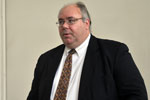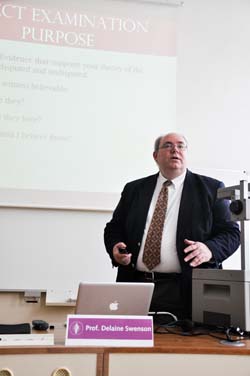 Even though he had liked working as a lawyer in the United States, Professor Delaine Swenson decided to leave to Poland to transform a legal system there. He has already helped to reform the legal systems in several countries. It is not easy, people in those countries are often influenced by the Soviet history. “We made a decision that instead of changing the minds of those in power now, we would try to influence the thinking of those would be judges, lawyers and parliamentarians in the future,” said Swenson when he visited Faculty of Law at Masaryk University.
Even though he had liked working as a lawyer in the United States, Professor Delaine Swenson decided to leave to Poland to transform a legal system there. He has already helped to reform the legal systems in several countries. It is not easy, people in those countries are often influenced by the Soviet history. “We made a decision that instead of changing the minds of those in power now, we would try to influence the thinking of those would be judges, lawyers and parliamentarians in the future,” said Swenson when he visited Faculty of Law at Masaryk University.
You have been working for over ten years as a trial attorney in the United States, then you decided to go to Europe and help to make a legal reform in Poland. How did you start the career in Central Europe?
While I very much enjoyed working as a lawyer in the United States, especially taking cases to jury trial, I realized that I also wanted to do more International work. I read an article about the efforts of the American Bar Association in assisting the former communist countries of Central and Eastern Europe in making a transition to legal systems based on the Rule of Law and thought this would be an excellent opportunity to combine my professional expertise with interesting and productive work overseas. The ABA offered me the position in Poland and I decided to accept it. It took some serious consideration as I had built up a successful law practice in the US and had to give it up in order to come to Poland for the first time. But I am very glad that I did, it has been and is continuing to be a great experience. Most of my lawyer friends in the US are very jealous of everything I have gotten to do.
Then you went to Central Asia to reform the legal system there. How was the situation in those countries when you came there?
One of the lessons we learned very early on is that Republics of Kazakhstan, Kyrgyzstan, Uzbekistan, Tajikistan and Turkmenistan had not really changed much from the Soviet days and that working with the government was not very productive. Strong presidents, corruption, weak parliaments and judiciary all mean that these countries are not very democratic.

We made a decision that instead of changing the minds of those in power now, we would try to influence the thinking of those would be judges, lawyers and parliamentarians in the future. This meant we had a very strong program directed to law students and young lawyers, judges, prosecutor’s etc. These young people were very eager for new experiences, saw and were willing to acknowledge the weaknesses of the present system, and are very interested in “Western” ideas. Real reform in Central Asia will be generational and we are already seeing that in places like Georgia and Ukraine.
How did those people in Central Asia accept your advice as an American?
Surprisingly there was very little “anti-american” sentiment in Central Asia. I can honestly say I never felt uncomfortable being American there. In fact, I was there during and after September 11th, 2001. I received a great deal of sympathy from the people I worked with there during this crisis.
What is your idea about good working legal system? How should it look like?
A good working legal system is one that is based on the concept of the Rule of Law. Rule of Law is a popular and perhaps overused saying, but the concept is an important one. From my point of view it means a system that at minimum adopts laws that respect basic principles of human rights through democratic means, applies laws consistent with a fair process independent from inappropriate outside influences, and where laws and the application of them are generally accepted and respected by government and citizens. The Rule of Law means that no one individual is above the law, be they President or Parliamentarian. As long as these principles are maintained, there are many different processes and procedures that can be applied in a good working legal system. The US model is not always the best or worst. It is the fairness of the process and the outcome that are important in deciding if a legal system is good or not.
Let’s talk a bit also about your academic career. You are a Professor at John Paul II Catholic University of Lublin. What is the difference between American and Polish legal education?
The biggest difference is that Polish law students are undergraduates and American law students have already graduated from University and received a degree, so in the US law school is a graduate program. This makes a difference in terms of the experience, knowledge and level of maturity of the students. The first few years of University students are still maturing and developing their own personalities, it is a time of experimentation and adaption to living away from home and having increased independence, I am not so sure it is the best time to study law. As a professor I am fortunate to avoid most of the effect of this as I generally teach upper class students who have matured a bit more.
And is there a difference between that what law students learn at school in the US and in Poland?
Yes, there is a difference. Polish legal education system focus much more at legal theory education than at legal skills. Teaching theory is important, but if you don’t give the students the skills and experience of putting the theory into practice, then the theory is wasted. This is the reason I started the Center for Advancing Legal Skills. Lawyers at major law firms in Poland tell me: I can hire the best Polish law graduates, but they don’t know how to do anything. I believe this is changing, but will take some time.
You are also a coach of American football in Poland. How good are Polish students in your national sport?
It has been quite fun to coach the Lublin Titans. I grew up playing with an American football from my early childhood, going to and watching games, it is part of my cultural education. To see 20 year old’s who have never even held an American football before, is strange at first, and as a coach it is hard to remember to teach the basics sometimes. Language of course is another barrier. Sometimes there are not even any Polish terms for the American football terms, so a lot of explanation is necessary, and demonstration. I also discovered that I am not as young as I think I am when I have to demonstrate American football moves for my young players! But we have a group of very enthusiastic players and they try very hard. With time and practice I think they will become good at the basic American football skills, and American football is like a drug, once you get involved it is hard to stop.
You have seen a big part of the world – which country do you find the most interesting and why?
This is a difficult question for me to answer as I find exploring new countries and cultures very enjoyable and it is hard to pick out a favorite out of so many. If the criteria is most interesting, I would have to say the United States first. Partly this reflects my not having lived there in 13 years, so whenever I go back it is like a first time visit for me. The US is big, geographically, ethically and culturally diverse, so there is always something new or different to see or do there. I would also mention China, which is a fascinating and very interesting country for some of the same reasons, big, diverse, interesting history and culture. However much I like visiting China I would not want to live there, there are too many problems that make life in China hard. I would say my 2nd most favorite country after the US is Poland. It has become a kind of home for me. Great people, history and culture.
What are you currently working on?
I have several new projects I am currently working on. First, I am working to put together a network of partners in the Czech Republic, Hungary, Poland, China and Great Britain for exchanging PHD students and giving them legal skills training and experience. In January I am starting a major project funded by the US Government designed to reform the legal education system and judiciary in The Republic of Georgia. I will be an expert for the Georgian Ministry of Higher Education and Georgian law faculties on legal education reform there and will work with Georgian judges on training and institutional development. And I officially opened a Human Rights Legal Clinic here in Lublin in December 2010 that will undertake strategic litigation and human rights cases to push for systematic changes in government or business behavior that violates human rights. I currently have two cases pending in front of the European Court of Human Rights.